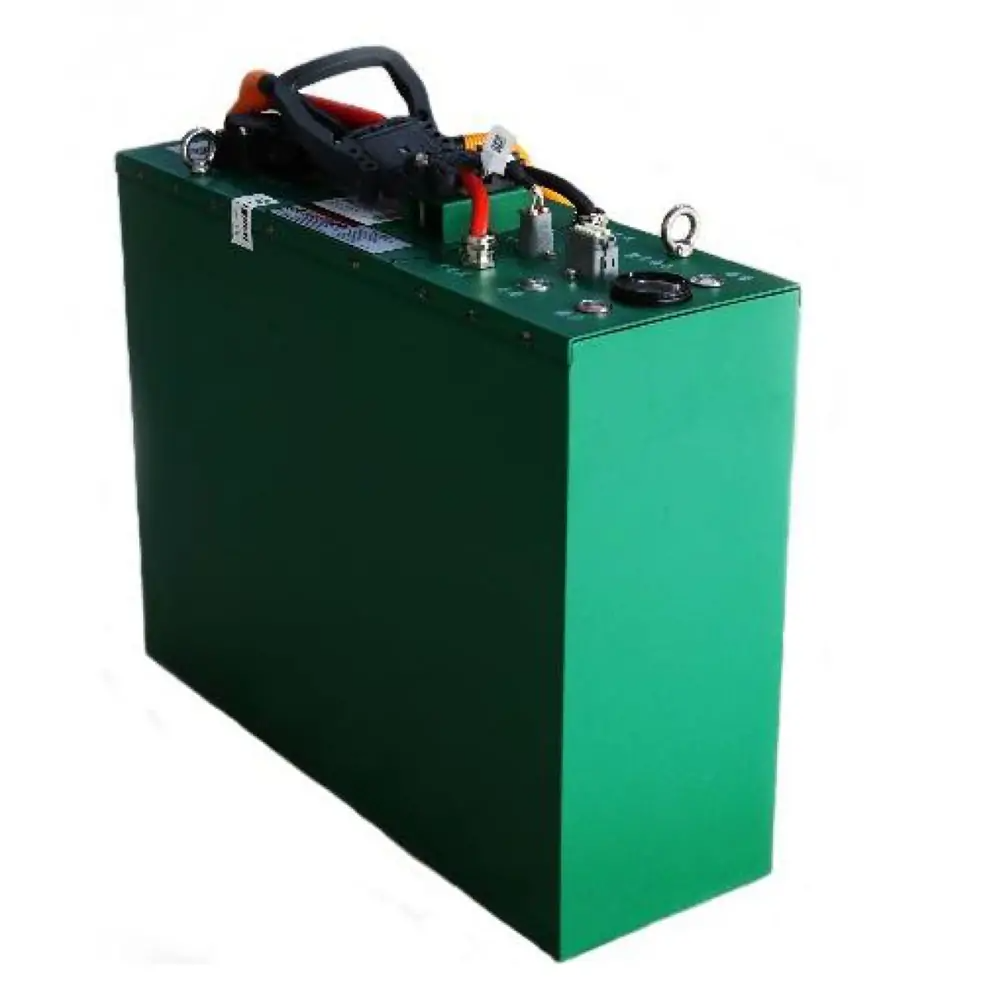ترقية أسطولك من الرافعات الشوكية إلى تقنية ليثيوم أيون الليثيوم أحد أذكى القرارات التي يمكن أن يتخذها المستودع أو مركز الخدمات اللوجستية. الفوائد واضحة: عمر أطول للبطارية، وصيانة أقل بكثير، ووقت تعطل أقل. ومع ذلك، تتغاضى العديد من الشركات عن جزء هام من اللغز - وهو شاحن بطارية الليثيوم للرافعة الشوكية.
إن الشاحن الذي تستخدمه له تأثير مباشر على الكفاءة, طول العمرو الإنتاجية لأسطول رافعاتك الشوكية. لهذا السبب فإن فهم نوع الشاحن الذي تحتاجه عمليتك - واختيار الشاحن المناسب - لا يقل أهمية عن البطاريات نفسها.
العوامل الرئيسية التي يجب مراعاتها قبل اختيار الشاحن
قبل الغوص في أنظمة الشحن المتاحة، من الضروري تحديد احتياجاتك التشغيلية الفريدة. إليك العديد من العوامل التي يجب أن تؤثر على قرارك:
نوع البطارية
جهد البطارية
وقت الشحن المطلوب
مواصفات الشحن
نمط استخدام المعدات
البنية التحتية للطاقة
مساحة الشحن المتاحة
ولفهم ما الذي يجعل الشاحن مثاليًا للرافعات الشوكية التي تعمل ببطاريات الليثيوم بشكل أفضل، استشرنا كبار خبراء الصناعة من شركة Delta-Q Technologies، وSPE Elettronica Industriale، وFronius International GmbH.
وفقاً ل رود دايريت، مدير تطوير الأعمال في شركة دلتا-كيو تكنولوجيز، "من أهم الاعتبارات الهامة وقت الشحن. فهو يحدد مقدار الطاقة التي يجب توصيلها إلى البطارية والسرعة التي يجب توفير هذه الطاقة بها."
عندما تعرف أن سعة بنك البطارية والمطلوب منها معدل الشحن، يمكنك تحديد إجمالي وقت الشحن. يتيح ذلك لفريقك تطوير استراتيجيات الشحن التي تعزز الإنتاجية وتقلل من وقت التعطل.
لا يتم شحن جميع البطاريات بنفس الطريقة
أحد الأخطاء الأكثر شيوعًا في عمليات تشغيل الرافعات الشوكية هو افتراض أن جميع أجهزة الشحن متشابهة. فهي ليست كذلك.
أنواع البطاريات المختلفة - خاصة حمض الرصاص و ليثيوم أيون-تتطلب أنظمة شحن مختلفة تماماً. بطاريات الليثيوم أيون حساسة بشكل خاص لمعدلات الشحن وتقلبات الجهد والتحكم في درجة الحرارة. يمكن أن يؤدي استخدام الشاحن الخاطئ إلى تقصير عمر البطارية أو حتى جعلها غير صالحة للاستخدام.
لهذا السبب فإن كل بطارية ليثيوم يباي تم تصميم الشاحن ليتناسب مع احتياجات الشحن المحددة. تأخذ شواحننا في الحسبان مستويات الجهد ومعدل الشحن وبيئة التشغيل من أجل زيادة صحة البطارية إلى أقصى حد و الأداء.
الشحن التقليدي: الطريقة القديمة في القيام بالأمور
تاريخياً بطاريات الرصاص الحمضية هيمنت على سوق الرافعات الشوكية الكهربائية. كان الشحن يتضمن إزالة البطارية في نهاية كل وردية ووضعها في منطقة شحن مخصصة. عادةً ما تستغرق هذه العملية من 8 إلى 10 ساعات - بالإضافة إلى 8 ساعات إضافية ل فترة التهدئة.
علاوة على ذلك، وبسبب تركيبها الكيميائي، تتطلب بطاريات الرصاص الحمضية غرفًا خاصة لإدارة مخاطر الانسكابات الحمضية, التسريباتو انبعاثات الغازات الخطرة. إذا كنت تعمل في نوبات متعددة، فستحتاج على الأرجح إلى ثلاث بطاريات منفصلة لكل رافعة شوكية لاستيعاب وقت التعطل المطلوب.
داستن لوفمدير تطوير الأعمال التنفيذي في شركة فلايت سيستمز للمنتجات الصناعية (FSIP)، يقول: "تعمل إعدادات الشحن التقليدية بشكل أفضل مع عمليات النوبة الواحدةحيث يكون الاستخدام اليومي للطاقة في حدود السعة الإجمالية للبطارية. وفي هذه الحالة، يمكن شحن البطاريات طوال الليل بينما تبقى داخل الرافعة الشوكية."
على الرغم من أن يباي ليثيوم يمكن شحن البطاريات من الناحية الفنية باستخدام طريقة تقليدية، فإن الميزة الحقيقية تقع في حلول شحن أكثر تقدماً وأسرع.
الشحن السريع: تغيير قواعد اللعبة في العمليات متعددة النوبات
أحد أكبر التحديات التي تواجه شركات الخدمات اللوجستية هو تقليل وقت التوقف عن العمل مع الاستمرار في تحقيق الحد الأقصى للإنتاج التشغيلي. هذا هو المكان الشحن السريع يصبح رصيداً قيّماً.
وفقاً ل دافيد مارتيلومدير المبيعات الوطنية في شركة Fronius International GmbH، الشركات التي تتحول من رافعات شوكية تعمل بغاز البترول المسال إلى أخرى كهربائية تعمل بالطاقة بطاريات الليثيوم أيون يمكن أن يؤدي إلى حد كبير تقليل استخدام الكهرباءوالتخلص من الحاجة إلى بطاريات متعددة، وخفض إجمالي البصمة الكربونية.
لماذا يُعد الشحن السريع مثاليًا؟
يحافظ على تشغيل الرافعات الشوكية عبر ورديات متعددة
يزيل الحاجة إلى تبديل البطاريات
يقلل من تكاليف العمالة
توفر مساحة أرضية قيمة
تقليل وقت التعطل وزيادة وقت التشغيل
فهم مستويات الشحن الثلاثة
فيما يلي تفصيل سريع لمستويات الشحن الثلاثة الشائعة المستخدمة في عمليات الرافعة الشوكية الصناعية:
1. الشحن التقليدي
المرتجعات: 16-18 أمبير لكل 100 أمبير ساعة
معدل الشحن: 16-20%
الوقت المطلوب شحن لمدة 8 ساعات + 8 ساعات تبريد
الأفضل لـ استبدال البطارية و نوبة واحدة العمليات
2. شحن الفرص
الإرجاع 30 أمبير لكل 100 أمبير ساعة
معدل الشحن: حتى 30%
الوقت المطلوب: نوافذ مرنة لمدة ساعتين
الأفضل لـ طلب منخفض أو عمليات النوبة الواحدة مع فترات راحة
3. الشحن السريع
الإرجاع 40-50 أمبير لكل 100 أمبير ساعة
معدل الشحن: حتى 501 تيرابايت 3 تيرابايت
الوقت المطلوب: فترات راحة قصيرة (15-30 دقيقة)
الأفضل لـ متعدد النوبات, ارتفاع الطلب العمليات
مع نظام الشحن السريع الذكي من يباي ليثيوم ليثيوم،يمكن شحن الرافعات الشوكية بسرعة أثناء فترات التوقف الطبيعية مثل وقت الغداء أو تغيير الورديات، مما يوفر طاقة كافية للحفاظ على تشغيل الماكينات طوال اليوم.
حلول الشحن المتقدمة من يباي ليثيوم يباي ليثيوم
منذ ما يقرب من عقد من الزمان, يباي ليثيوم قدّمت محطات شحن ذكية من الدرجة الأولى للتطبيقات الصناعية. لدينا الرائد شاحن بطارية الليثيوم ثنائي المسدس يتميز بإخراج تيار محسّن ومُحسّن من أجل عمليات مناوبة الرافعة الشوكية التي تمتد إلى ما بعد علامة 18 ساعة القياسية.
سواء أكنت بحاجة إلى وحدة مدمجة مثبتة على الحائط أو نموذج قائم على الأرض عالي السعة، تقدم Yibai مجموعة من تكوينات محطة الشحن:
أجهزة الشحن الأرضية
الأنظمة المثبتة على الحائط
خيارات إدارة الكابلات المدمجة
نحن نسهل عليك إيجاد حل يناسب تصميم مستودعك ويلبي احتياجاتك من الطاقة.
تخطيط استراتيجية الشحن الخاصة بك
عند اختيار شاحن بطارية رافعة شوكية، ضع في اعتبارك الأسئلة التالية:
هل تحتاج إلى التشغيل المستمرأم يمكنك تحمل تكاليف وقت التوقف عن العمل?
ما هو متوسط المدة من نوبات عملك؟
هل تقوم بتشغيل في الداخل, في الهواء الطلقأم كلاهما؟
كم عدد الرافعات الشوكية التي تحتاج إلى الشحن في وقت واحد؟
هل لديك ما يكفي من البنية التحتية الكهربائية?
ستساعدك إجاباتك عن هذه الأسئلة في تحديد طريقة الشحن المثالية و إعداد المعدات.
قصص نجاح العملاء

الأسئلة الشائعة حول البطاريات القابلة لإعادة الشحن المخصصة
هل يمكنني استخدام شاحن حمض الرصاص لرافعة شوكية ذات بطارية ليثيوم؟
لا، تتطلب بطاريات الليثيوم أيون شواحن محددة لضمان نقل آمن وفعال للطاقة. يمكن أن يؤدي استخدام الشاحن الخاطئ إلى تلف البطارية أو تقليل عمرها الافتراضي.
ما المدة التي يستغرقها الشحن السريع لبطارية الليثيوم للرافعة الشوكية؟
يستغرق الشحن السريع عادةً 15-30 دقيقةحسب سعة البطارية ومخرج الشاحن. يمكن القيام بذلك أثناء فترات استراحة العمل دون مقاطعة سير العمل.
ما الفرق بين الفرصة والشحن السريع؟
فرصة الشحن توفر طاقة أقل وهي مناسبة للعمليات الخفيفة، في حين أن الشحن السريع مصممة ل ارتفاع الطلب, البيئات متعددة النوبات ويوفر إعادة تعبئة أسرع وأعلى طاقة.
كيف أعرف ما هو الشاحن الذي أحتاجه لبطارية رافعة الليثيوم الشوكية الخاصة بي؟
يجب عليك مراعاة عوامل مثل نوع البطارية, الفولطية, معدل الشحن, مدة المناوبةو البنية التحتية للطاقة. يوصى أيضاً باستشارة خبير بطاريات أو مورد الشاحن الخاص بك.
هل شواحن الليثيوم Yibai آمنة للتشغيل المستمر؟
نعم. شواحن الليثيوم يباي مصممة مع بروتوكولات السلامة المتقدمةبما في ذلك مراقبة درجة الحرارة وتنظيم الجهد والحماية من الحمل الزائد، مما يجعلها موثوقة للاستخدام المستمر.
اختيار المناسب شاحن بطارية الليثيوم للرافعة الشوكية ضروري للحفاظ على عملية مناولة المواد بكفاءة وفعالية من حيث التكلفة. باستخدام الشاحن المناسب، يمكنك تقليل وقت التعطل، وتحسين السلامة، وتقليل تكاليف العمالة والمعدات، وزيادة العائد على الاستثمار إلى أقصى حد.
يباي ليثيوم تقدم مجموعة كاملة من حلول الشحن الذكي مصممة خصيصًا لتلبية المتطلبات الحديثة لأساطيل الرافعات الشوكية متعددة المناوبات وعالية الأداء. سواء كنت تدير نوبة عمل واحدة أو مستودعًا يعمل على مدار الساعة طوال أيام الأسبوع، فإن Yibai لديها الشاحن الذي تحتاجه.
هل تريد معرفة المزيد؟ تواصل مع فريقنا اليوم لتخصيص البنية التحتية للشحن وأطلق العنان للإمكانات الكاملة لبطاريات رافعة الليثيوم الشوكية الخاصة بك.
